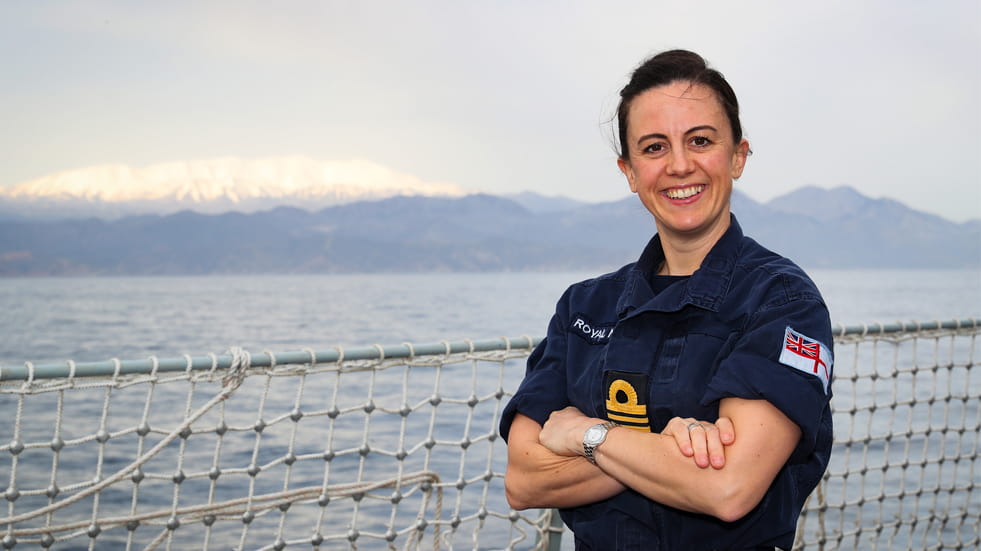Logistics Officer
You’ll ensure our operations run efficiently, and that all of our personnel have what they need, when they need it, wherever they are in the world.
- £31,000 - £110,500
- A-Levels / college qualifications
- Surface Fleet
- Logistics
- Officer level
£31,000
£38,500
Extra pay
Management
6 weeks
Travel

As a Logistics Officer you’re responsible to the command for ensuring that everything runs smoothly. Without you, the operation would quickly fall apart.
Role details
What you’ll do
Logistics is the backbone of the Royal Navy; Logistics Officers are its leaders. Sustaining over 35,000 men and women across the world, every day, is no mean feat. It’s your job to make sure they have what they need, when they need it. That means everything from bullets and bed linen, to fuel and food. Without you, global naval operations would literally grind to a halt. It seems like a gargantuan task, but for a Logistics Officer, it’s all in a day’s work.
Your role
- Day to day, you’ll always be one step ahead of global operations and naval functions, as you manage six months’ worth of equipment and supplies.
- You’ll lead your team of logisticians to ensure your ship has what it needs to always be operationally effective, whether that’s delivering humanitarian aid or deployment on a combat mission.
- From supply chain management to accounting, your role is demanding and all-encompassing; you’ll co-ordinate the movements of supplies and personnel on a global scale.
- You’ll gain a broad range of qualifications that are valued by employers around the world, including internationally recognised Charterships.
Pay & benefits
- A starting salary in excess of £31,000
- Salary rising to over £38,500 after 2 years
- Potential earnings over £110,500
- An excellent pension scheme
- Six weeks of paid holiday every year
- Free medical and dental care
Skills for life
Qualifications you'll gain
- Study for an MSc or MA
- Gain specialist vocational qualifications as your career develops, like membership to the Chartered Institute of Logistics and Transport, the Institute of Administrative Management and the Chartered Institute of Personnel and Development
Skills you'll develop
- Learn how to lead people in a highly pressurised environment, mentoring more junior personnel and overseeing some extremely complex projects
- Gain an in-depth knowledge of everything from supply chain and personnel management, to law and accounting, managing multiple tasks at the same time, while maintaining a cool head and never losing sight of the bigger picture
Eligibility
- You must be between 18 and 39
- You’ll need a minimum of 72 UCAS points. These can be accrued from either GCE A/AS levels (or equivalent) or National Diplomas (e.g., BTEC)
- You'll need at least 5 GCSEs at grades A*-C (9-4) (or Scottish equivalent) which must include English Language and Mathematics
- You must be a United Kingdom national, or Commonwealth citizen, or Dual National. Dual Nationality restrictions do apply
- A Body Mass Index (BMI) between 18 and 28 (between 17 and 27 if under 18)
Skills & Interests
- The ability to thrive on responsibility and lead from the front
- Confidence making key decisions in high-pressure situations
- A problem-solver, with a common-sense approach, who can work well as part of a team
- A real sense of adventure, with a high level of physical and mental fitness
Joining Process
From picking your role to the first day of training; everything you need to know as an officer
Submit an application
Defence Aptitude Assessment (DAA)
You’ll be tested on: Verbal Reasoning, Numerical Reasoning, Work Rate, Spatial Reasoning, Electrical Comprehension and Mechanical Comprehension.
To prepare, you can practise the DAA
Interview
Medical and eye tests
Pre-Joining Fitness Test (PJFT)
Interview
Admiralty Interview Board (AIB)
Career Progression
Got a question?
Our virtual recruiter is available to answer your questions 24 hours a day
